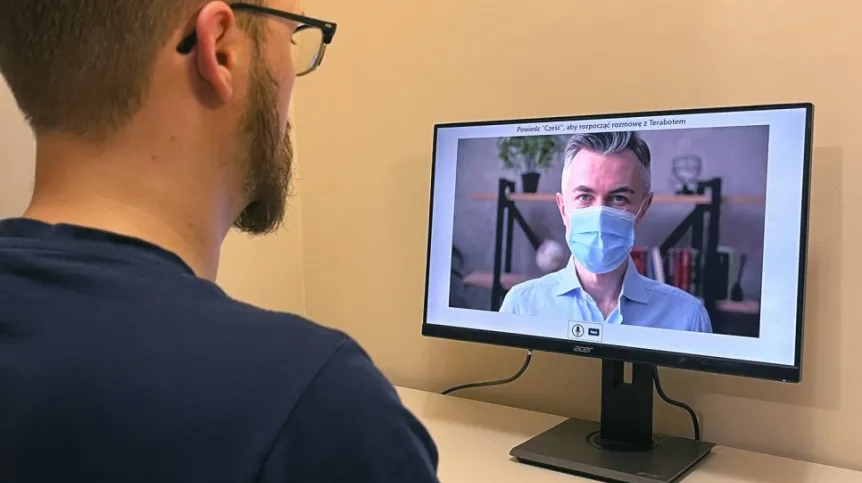
Artificial intelligence can help manage fear, shame and anger, assist in mindfulness training, and even help patients resist their inner voices. The effectiveness of the therapeutic chatbot called Terabot is now being verified, the Warsaw University of Technology reports.
A preliminary study on the treatment of auditory hallucinations using digital tools has shown that such therapy - under medical supervision - reduces symptoms in conditions such as schizophrenia. In the next stage, an independent tool called Terabot was used. The chatbot system developed at the Faculty of Electronics and Information Technology of the Warsaw University of Technology was used in a pilot cognitive-behavioural therapy (CBT).
The originator of the research project was Dr. Izabela Stefaniak. The project was conducted by Dr. Artur Janicki from the Warsaw University of Technology.
MAKE NEGATIVE VOICES POSITIVE
Auditory hallucinations occur in schizophrenia and other diseases. They make everyday functioning difficult and lower the self-esteem of people who hear them. To improve patients' quality of life, psychiatrists usually use pharmacological treatment.
Scientists from Warsaw University of Technology used different methods. 'In our case, it was a computer avatar ('talking head'), controlled by the therapist. During the first two sessions, the computer character repeated the negative sentences that the patients heard in their heads, and during the following four sessions these sentences were changed into positive content,’ says Dr. Janicki.
He adds that the doctor continued to support the therapy participants, taught them how to deal with voices and resist them. The study included 23 patients who - in the opinion of the controllers - responded very well to the new method. Indicators on the scale for assessing psychotic symptoms and measuring the strength of hallucinations decreased significantly. The difference persisted even after three months. It also turned out that people who underwent the therapy wanted to work with computers. The results of the experiment were published in 2019 in the journal Schizophrenia Research.
WORKING WITH EMOTIONS AND MINDFULNESS
Further work of the team resulted in the development of the Terabot system. 'Unlike the previous project, this system was automatic, not controlled by a psychiatrist. Terabot conversed with the patient, recognizing what the patient was saying and what their emotional state was. Depending on the given answers, it adjusted its statements,’ says Dr. Janicki.
The aim of the study was to learn about how to deal with emotions and develop mindfulness. Three exercises developed by Dr. Izabela Stefaniak concern the emotions that patients most often face: fear, shame and anger. The patients agreed with the doctor what they wanted to focus on. The first part of the session was a dialogue with Terabot with elements of CBT therapy. In the second part, the system proposed a relaxation exercise.
A total of 38 people took part in the study. Analyses are currently underway to determine how much the system helped patients. 'Many patients responded very well. It turned out that they were more open in front of the computer and spoke more than with a doctor,’ says Dr. Janicki.
He adds that Terabot still needs to be improved. The system does not always understand the patients' intentions well. The team strives to make Terabot more empathetic, for example to easily recognise when the therapy participant has finished speaking and not wait too long to respond or interrupt the patient.
The project 'Terabot - dialogue system for cognitive-behavioural therapy' started in January 2021 and continued until June 2023. It was financed as part of the 'Excellence Initiative - Research University' programme implemented at the Warsaw University of Technology. It was among the winners of the research grant competition 'SzIR-2' Priority Research Area - Artificial Intelligence and Robotics. (PAP)
PAP - Science in Poland
kol/ bar/ kap/
tr. RL













